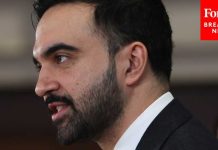
As Democrats erupt in open revolt against their own Senate leadership over a shutdown deal, the left’s internal chaos exposes deep cracks and signals how progressive infighting could threaten America’s stability if their agenda regains control.
Story Snapshot
- Democratic lawmakers and progressive groups demand Senate Minority Leader Chuck Schumer resign after a shutdown compromise.
- Progressives accuse Schumer of surrendering to Republican demands, especially over Obamacare subsidies.
- Public infighting and viral backlash highlight severe fractures within the Democratic Party.
- The leadership crisis may embolden radical factions and disrupt future legislative negotiations.
Democratic Infighting Erupts After Shutdown Deal
A fierce internal battle has gripped the Democratic Party after a group of Senate Democrats broke ranks to support a bipartisan agreement reopening the government. The deal, advanced with the help of eight Senate Democrats, has provoked a wave of outrage from progressive lawmakers and activist groups, many of whom accuse Senate Minority Leader Chuck Schumer of capitulating to Republican priorities. Despite Schumer’s own vote against the agreement, critics argue his failure to maintain party unity represents a breakdown in leadership. Calls for Schumer’s resignation have escalated as viral memes and online campaigns target his perceived surrender, with progressive factions demanding a new direction for Senate leadership.
This open rebellion is rare in the history of the Senate, where party leaders usually keep discord behind closed doors. The furor centers on the deal’s lack of guaranteed action on Affordable Care Act (ACA) subsidies, a critical issue for the Democratic base. Progressives claim the agreement leaves millions facing uncertainty over healthcare costs, while moderates argue compromise was necessary to end the damaging shutdown. The episode’s public nature has amplified the rift, as lawmakers and advocacy groups take to social media to denounce Schumer’s handling of negotiations and to rally supporters to their cause.
‘Trainwreck!’ More Democrats Fume at Shutdown Deal, Call for Schumer’s Headhttps://t.co/RQwPONkXp9
— Mediaite (@Mediaite) November 10, 2025
Progressive Groups and Lawmakers Lead Leadership Revolt
Progressive representatives such as Seth Moulton, Jared Moskowitz, and Ro Khanna have been especially vocal, joining organizations like Our Revolution and Indivisible in demanding Schumer’s ouster. Their grievances are twofold: not only do they see the shutdown deal as a surrender on core progressive principles, but they view Schumer’s inability to prevent Democratic defections as a disqualifying failure. House Minority Leader Hakeem Jeffries has tried to project unity by supporting Schumer, yet his sharp criticism of the agreement as a “partisan Republican spending bill” underscores the party’s internal divide. The spectacle of Democrats feuding so openly sends a signal of weakness at a time when their party is already under pressure from an energized conservative movement.
Historically, such coordinated intraparty dissent over Senate leadership is almost unheard of. Schumer has faced previous backlash from progressives for what they see as excessive compromise, but never at this scale or intensity. The current uproar is fueled by viral imagery and coordinated messaging online, amplifying dissent and making party discipline harder to restore. This rift could have immediate electoral repercussions, as progressives threaten primary challenges and moderates fear alienating centrist voters.
Shutdown Fallout Highlights Progressive Agenda’s Instability
The government is set to reopen under the new deal, but the Democratic Party’s unity is in tatters. The future of ACA subsidies remains unresolved, with only vague promises for a future Senate vote. Americans relying on these subsidies face ongoing uncertainty, while federal employees and agencies receive temporary relief. The episode has intensified questions about Democratic strategy and the influence of radical elements within the party. For conservatives, the debacle is a stark reminder of the dangers posed by left-wing infighting and unchecked progressive demands—risks that President Trump’s administration has worked to shield the nation from since returning to office.
Short-term, the shutdown’s end brings relief, but the long-term implications for Democratic leadership are profound. The emboldening of progressive factions may make future legislative compromise even more difficult, increasing the risk of gridlock or further shutdowns. The healthcare sector, already rattled by the uncertainty over Obamacare subsidies, faces added instability as policy remains unresolved. The Democratic leadership crisis sets a precedent for public dissent and signals that the party may struggle to present a united front in the face of future conservative victories.
Political analysts now warn that this episode could reshape the balance of power within the Democratic caucus, as emboldened radicals challenge more moderate voices. While party leaders attempt to downplay the dispute, the public nature of the revolt makes it clear: profound ideological divides threaten to undermine the left’s ability to govern, should they return to power. As America moves forward under President Trump’s leadership, this turmoil underscores why so many voters have rejected progressive chaos in favor of constitutional order, fiscal sanity, and a government that works for the people—not radical ideologues or fractured party bosses.
Sources:
Dems Skewer ‘Trainwreck’ Schumer for ‘Caving’ Over Shutdown
‘Yes and yes’: Jeffries stands by Schumer as Dems fume over shutdown deal


















